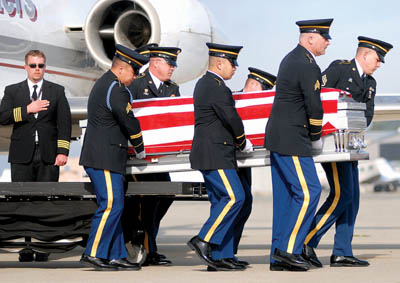Memories are complex because they bring back both the happy and the sad. I do not think that a Christmas will go by that I will not think of Army Staff Sgt. David H. Gutierrez, who died in Afghanistan on Christmas Day 2009; here were my thoughts at the time. I hope the Gutierrez family can find the happier memories in Christmas and I republish this in the hope you will never forget the real cost of your freedom to celebrate as you wish.
January 2010: A soldier comes home
This is an easy column to write and a difficult one. It’s easy because tragedy is compelling and the story of a fallen soldier with a family left behind is tragic – it’s difficult for exactly the same reason. I won’t be original; there is nothing I can say that hasn’t been said before. Change the name, change the place or change the date from 1775 to the day after tomorrow and it’s all too familiar.
The body of Army Staff Sgt. David H. Gutierrez came to the Hollister Airport Wednesday on its way to rest in Gilroy. The 35-year-old father of three died on Christmas day in Afghanistan of wounds suffered in the line of duty.
More than 100 people came to say thanks and lend moral support to his family. In addition to family and friends there were service personnel, peace officers, a group of escort motorcyclists, firefighters, a few local officials, members of the airport and military support community and some veterans. I know many of you wanted to come, but you just could not make it so I’ll try to describe what it was like.
It was cold and clear and there were many American flags – big ones, small ones and every size in between. Although there was no breeze, the flags did not hang limp. They didn’t flutter or snap, but they did have body to them – just the right for the circumstances, I thought, stupidly.
The airport ramp where the chartered plane brought Staff Sgt. Gutierrez home to his family was completely still – one plane, a hundred people, grey concrete and the flags. We live in a noisy world and it’s only when standing in total silence that you realize what quiet sounds like. I don’t even remember hearing the jet’s engines as it taxied. I know they were running and making that annoying whining sound, but somehow they were inaudible, it was very strange. The order was, “Present arms” then “Order arms” and the salute was rendered.
The flag-draped coffin was unloaded slowly and the honor guard in their Army Dress Blues moved it halfway across the ramp. The family came forward. I admired the professionalism of the honor guard and their uniforms – anything, so I would not have to look at his wife and children and hear them. I was just having a human reaction, but it still made me uncomfortable. I let my eyes wander, scanning past the scene, taking it all in but always avoiding stopping on the tableau in front of me.
It seemed that it took forever for them to say goodbye, but that was only because it was so terrible. Truth is that it was no time at all; they were saying goodbye forever – what could time matter?
Eventually they let him go to the waiting hearse, slowly, reluctantly, but inevitably. The grieving process had already started and was doing its job. Eventually they will touch all the bases – shock, emotional release, crisis, physical/emotional distress, hostility, guilt, depression, withdrawal and, finally, resolution and readjustment. We have documented it and codified it as we do so many things in modern society as if weighing and measuring will make it hurt less. It does not work – intellectual understanding does not cancel grief.
All the vehicles lined up and then the motorcade left, the escort left, the observers left. The ramp was empty. No matter what the government says in its spasms of political correctness and wordplay, America is at war. Most of America does not know it, but others know it all too well and – as always – a small group will bear the burden.
Marty Richman is a Hollister resident.










